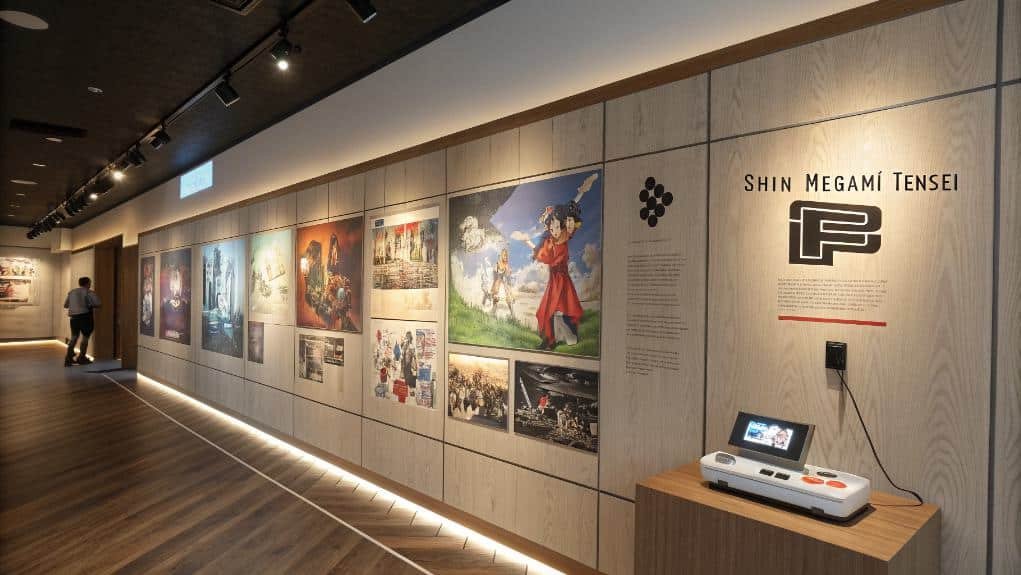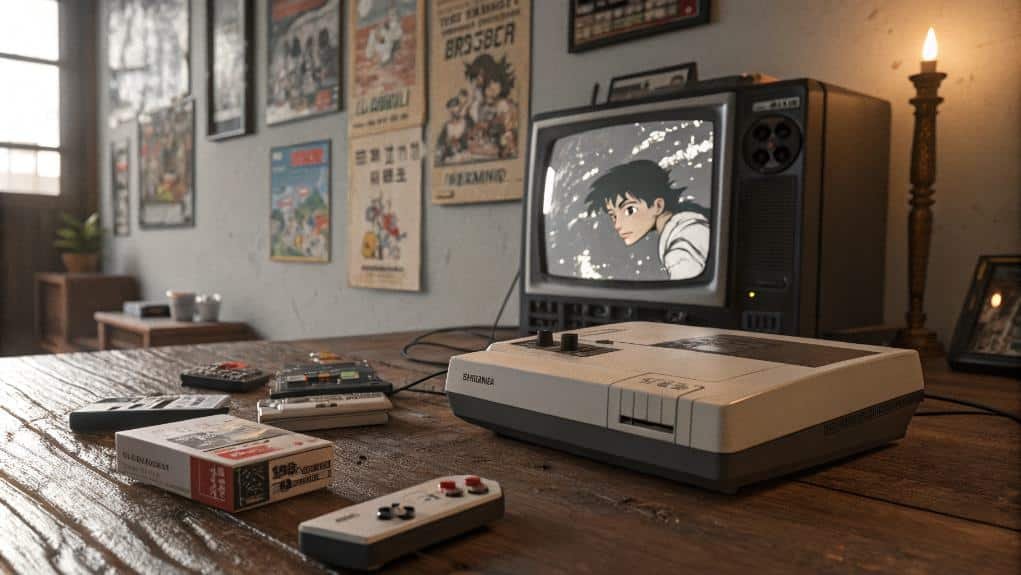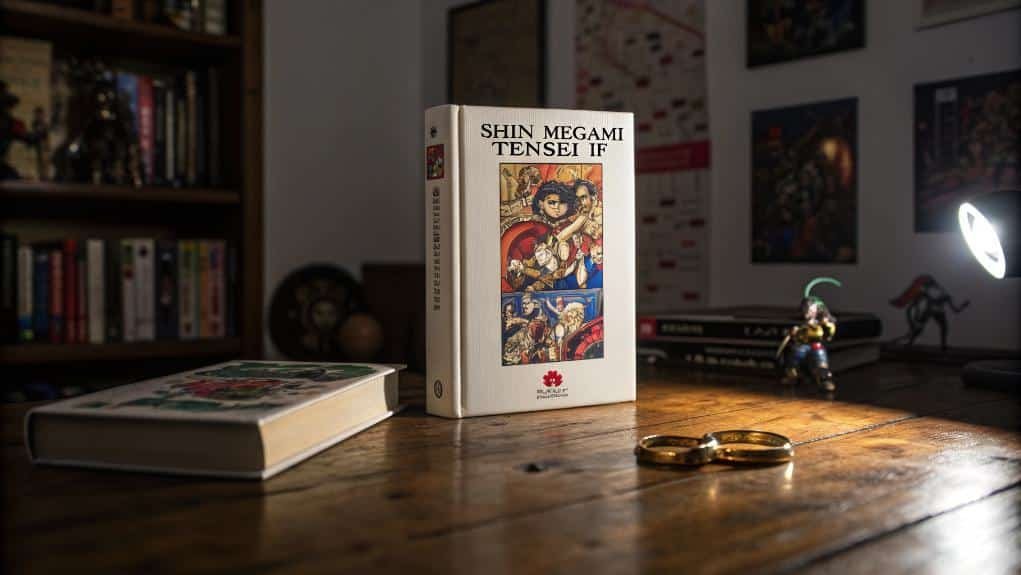Released on October 28, 1994, "Shin Megami Tensei If" revolutionized the JRPG genre with its blend of innovative mechanics and complex narratives. Set in a post-apocalyptic Tokyo, it introduced players to a world of demon-human coexistence and moral ambiguity. Its unique Press Turn Combat and engaging Demon Conversations transformed gameplay, while themes of isolation and revenge deepened its story. The game's rarity, heightened by limited releases, helped cultivate a devoted fanbase. This title not only laid the groundwork for the Persona series but also influenced future JRPGs, inviting exploration into its lasting legacy.
Key Takeaways
- "Shin Megami Tensei If" was released in Japan on October 28, 1994, and later remastered for PlayStation in 2002.
- A fan translation in 2018 improved accessibility, but the game remains unavailable on Xbox and Nintendo Switch.
- The game features innovative gameplay mechanics, including Press Turn Combat and Demon Conversations, enhancing strategic depth.
- Set in post-apocalyptic Tokyo in 2038, the story explores themes of demon-human coexistence and moral ambiguity.
- "Shin Megami Tensei If" influenced the franchise and the Persona series, establishing a precedent for narrative-driven gameplay in JRPGs.
Release and Development Timeline

Despite its innovative approach, "Shin Megami Tensei If" wasn't officially released outside Japan, which complicated its marketing strategies.
The lack of global distribution meant that dedicated fans sought alternative means to experience the game, leading to a PlayStation remaster on December 26, 2002, and a fan translation by Aeon Genesis in 2018. The remaster featured updated graphics and additional music, yet it still didn't expand its reach to platforms like Xbox or Nintendo Switch. Instead, it remains a reflection of the cult following that the series has cultivated, underscoring its importance within the RPG landscape despite the limitations imposed by its early development and marketing decisions. The game is considered a side-story of the mainline series, highlighting its unique position within the broader Shin Megami Tensei universe.
Unique Gameplay Features
"Shin Megami Tensei If" introduces a myriad of unique gameplay features that greatly enhance its turn-based combat system and overall player experience. The game employs a Press Turn Combat system, allowing players to exploit enemy weaknesses for additional actions, thereby deepening their tactical approach. Each demon brings its own exclusive skills, emphasizing the importance of diverse demon strategies. Additionally, players can gain a tactical advantage by accumulating Press Turn Icons throughout battles, which can significantly influence the outcome of encounters.
| Feature | Description | Impact on Gameplay |
|---|---|---|
| Press Turn Combat | Exploiting weaknesses grants extra actions | Maximizes player strategy and control |
| Magatsuhi Skills | Special skills activated once the gauge is full | Adds layers to offensive and defensive tactics |
| Demon Conversations | Negotiating can lead to alliances with demons | Increases complexity and engagement |
| Auto-Skill Mode | Automates skill use targeting weaknesses | Streamlines combat decisions |
| Subquest Enhancements | Offers diverse challenges and rewards | Enhances gameplay variety |
These innovative combat mechanics and systems encourage players to think critically about their strategies, making each encounter a blend of planning and adaptability. Overall, "Shin Megami Tensei If" solidifies its legacy by offering a rich, engaging gameplay experience that challenges both new and veteran players.
Story and Setting Overview

In "Shin Megami Tensei If," the apocalyptic landscape of Tokyo serves as a stark backdrop for the complex dynamics of demon-human coexistence.
The narrative intricately weaves themes of isolation and revenge, embodied in Hazama's transformation into the Demon Emperor, challenging players to navigate a world rife with moral ambiguity. Players can also recruit demons through negotiation or fusion, adding layers to their strategic choices.
As players partner with various characters, they confront the consequences of their choices against a hauntingly familiar yet twisted urban environment.
Apocalyptic Tokyo Landscape
The haunting landscape of post-apocalyptic Tokyo in Shin Megami Tensei IV: Apocalypse serves as a stark backdrop for a narrative steeped in chaos and moral ambiguity. Set in 2038, the city is a shadow of its former self, ravaged by war and encased in a protective rock dome that highlights its dystopian aesthetics. Urban survival becomes the norm as inhabitants scavenge for resources amidst a ruling class of angels and demons. This dynamic is further complicated by the presence of a turn-based Press Turn System, which allows players to strategically exploit enemy weaknesses during battles.
The contrast between this devastated Tokyo and the medieval Mikado kingdom creates a rich tapestry of conflict and desperation.
The game immerses players in a world where underground shelters become sanctuaries for the remnants of humanity, struggling against both external threats and their own ethical dilemmas. The oppressive atmosphere accentuates the stakes of the protagonist, Nanashi, and his quest against the ruthless deity Krishna, who embodies the ultimate existential threat.
Through its vivid and intricate environment, Shin Megami Tensei IV: Apocalypse not only crafts a compelling narrative but also serves as a poignant commentary on the fragility of civilization and the choices that define humanity amidst ruins.
Demon-Human Coexistence Dynamics
How does the tumultuous relationship between demons and humans shape the narrative of *Shin Megami Tensei If*? The game unfolds within the confines of Karukozaka High School, transformed into a demon domain, compelling students and teachers to confront coexistence challenges.
Ideo Hazama, the Demon Emperor, amplifies the stakes, forcing characters to navigate ethical dilemmas while forming demon alliances. Protagonist interactions with peers like Yumi Shirakawa and Akira Miyamoto reveal contrasting motivations: one seeks peaceful resolutions, while the other spirals toward revenge consequences, ultimately leading to darker fates. Additionally, the Guardian Spirit system introduces a mechanic where characters are revived upon death, influencing their development and the overall narrative.
The narrative depth is enriched by multiple endings shaped by moral choices, reflecting the complexities of demon-human relationships. Reiko Akanezawa's empathy towards Hazama exemplifies how understanding can lead to resolution amidst chaos.
In contrast, Akira's fate warns of the perils of vengeance. Each character's journey illustrates the intricate balance between cooperation and conflict, emphasizing that coexistence is fraught with moral ambiguity.
As students grapple with their new reality, their choices shape not only their destinies but also the school's fate, highlighting the profound impact of their interactions in a world where demons and humans must coexist.
Series Connections and Impact
Shin Megami Tensei: If serves as a pivotal entry in the franchise, considerably shaping the trajectory of both its own series and the subsequent Persona franchise. This game marked a significant departure from the series origins, introducing the high school setting that would become a hallmark of Persona.
By embedding the demon-fighting mechanics within a more relatable, everyday environment, the game initiated a gameplay evolution that blended social simulation with traditional dungeon crawling. Additionally, thematically exploring concepts of self and otherness, the game set the stage for deeper narrative developments in future titles.
The success of Shin Megami Tensei: If directly influenced the development of the first Persona game, which expanded upon these ideas by focusing more intensely on character interactions and personal growth.
While both series share key mechanics, like demon negotiation and fusion, their divergent narratives highlight a tonal shift—Shin Megami Tensei leans towards darker, apocalyptic themes, while Persona explores lighter, more personal stories.
Ultimately, Shin Megami Tensei: If's innovations laid the groundwork for a distinct franchise in Persona, ultimately leading to their separation into unique entities with dedicated fan bases, each contributing richly to the JRPG genre.
Historical Context of Release

Upon its release on October 28, 1994, *Shin Megami Tensei: If* emerged as a significant title within the evolving landscape of Japanese role-playing games (JRPGs). Developed by Atlus, it distinguished itself with innovative game mechanics that allowed players to navigate a smaller, more intimate environment compared to its predecessors. This choice reflected a shift in design philosophy, emphasizing character development and interpersonal relationships. The game drew cultural influences from British boarding school settings, echoing thematic elements found in the 1968 film "If…." This unique backdrop provided a fresh perspective in the JRPG genre, as it intertwined social dynamics with the supernatural. The incorporation of these cultural references not only enhanced narrative depth but also connected with players on a relatable level. Additionally, the game's part of the Shin Megami Tensei series further solidified its place in the genre's history. Despite its success, *If* faced limitations in regional availability, remaining exclusive to Japan until a fan translation surfaced in 2018. This lack of official international release underscores the challenge faced by many JRPGs of its era in reaching a global audience. Nevertheless, the game's re-releases across various platforms, including the PlayStation and Nintendo Switch, have allowed it to maintain relevance within gaming discussions today.
Legacy Within the SMT Series
*Shin Megami Tensei: If*'s legacy within the SMT series is marked by its profound influence on subsequent titles and the broader JRPG landscape. This game introduced innovative game mechanics, such as the guardian system, which reintroduced the reincarnation theme and added strategic depth to gameplay.
Spin-offs like *Persona* and *Devil Summoner* drew inspiration from its smaller-scale environments and high school settings, showcasing the impact of *If* on narrative structures in future titles.
Thematic analysis reveals that the exploration of the Seven Deadly Sins in *If* resonated throughout the franchise, shaping the thematic cores of later games. Critics and fans have acknowledged the game's cultural significance, noting how its unique approach to storytelling and gameplay mechanics elevated the SMT series' reputation. Moreover, the game's poor execution has served as a cautionary tale for future developers within the franchise.
*If*'s placement in a complex timeline within the SMT franchise highlights its connection to various narratives, further solidifying its importance. Adaptations and re-releases have guaranteed that *If* remains accessible, allowing new generations to engage with its innovative ideas. Ultimately, *Shin Megami Tensei: If* stands as a cornerstone in the SMT series, influencing game design and narrative exploration for years to come.
Cult Following and Rarity

The cult following of Shin Megami Tensei If emerges from its unique blend of challenging gameplay and profound thematic exploration, which resonates deeply with dedicated fans in both Japan and the West. Limited availability in its early years further fueled this allure, as many players sought out the elusive titles that offered an alternative to mainstream RPGs like Final Fantasy. This combination of scarcity and distinctiveness has solidified its status as a cherished gem within the gaming community. The game introduced demon recruitment mechanics that set the stage for future titles in the series, enhancing its appeal among players.
Dedicated Fan Community
Since its inception with Digital Devil Story: Megami Tensei in 1987, the dedicated fan community surrounding the Shin Megami Tensei series has flourished, exhibiting a remarkable blend of loyalty and passion.
Over 35 years, this niche yet devoted fanbase has engaged deeply with the franchise, spanning more than 50 diverse titles. Their commitment to fan engagement is evident through collaborative efforts like the Megami Tensei Wiki, which preserves and disseminates vital information about the series.
Community events celebrate significant milestones, such as the release of remasters like Shin Megami Tensei III: Nocturne HD Remaster, rekindling interest and fostering connections among fans. The series' rarity, particularly with niche titles that lack official translations, enhances its allure, making rare finds highly sought after. Additionally, exclusive releases, such as Shin Megami Tensei V, further cultivate a sense of belonging among fans, uniting those who appreciate both the main series and its popular spin-offs like Persona. The dedicated fanbase has remained committed to the franchise through the years, ensuring the survival of its long-standing legacy.
This vibrant community not only showcases long-standing commitment but also reflects the series' cultural impact, influencing fan creativity through art, cosplay, and other expressions of devotion.
Limited Availability Factors
Maneuvering through the complexities of limited availability factors reveals why "Shin Megami Tensei If" has garnered a cult following among gaming enthusiasts. The game faced significant availability challenges due to its initial release on the Super Famicom in 1994, with subsequent ports appearing sporadically over the years. Distribution limitations further exacerbated its rarity, as it wasn't widely available outside Japan until digital platforms emerged.
| Release Year | Platform | Availability |
|---|---|---|
| 1994 | Super Famicom | Limited physical copies |
| 2002 | PlayStation | Digital release |
| 2021 | Nintendo Switch Online | Expanded access |
The limited production runs and lack of reprints for the original version intensified its scarcity. Additionally, language barriers hampered non-Japanese players until fan translations emerged, further solidifying its status as a cult classic. As a precursor to the Persona series, "Shin Megami Tensei If" not only influenced future titles but also created a unique narrative that resonated with fans, making its rarity an integral part of its enduring appeal.
Influence on Future JRPGs
Shin Megami Tensei If not only carved its niche within the franchise but also laid a foundational blueprint for future JRPGs. Its influence is particularly evident in the creation of spin-off series like *Persona* and *Devil Summoner*, which adopted its smaller-scale environments and character-driven narratives.
By focusing on character development, *If* showcased how personal stories could intertwine with broader themes, setting a precedent for future entries.
The game introduced innovative gameplay mechanics, such as the partner system and revival mechanics, which enhanced the tactical depth of JRPGs.
Additionally, its exploration of philosophical themes, particularly the Seven Deadly Sins, encouraged subsequent titles to tackle complex moral dilemmas and engage in thematic exploration that questioned ethical boundaries. This thematic experimentation not only enriched the narratives but also broadened the scope of what JRPGs could achieve.
Critically acclaimed for its unique blend of horror and fantasy, *Shin Megami Tensei If* demonstrated the franchise's ability to innovate while remaining rooted in its core themes.
This legacy continues to resonate, inspiring developers to push the envelope in character development and narrative depth in modern JRPGs.

